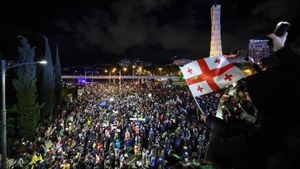Donald Trump’s controversial proposal to take control of Gaza has sparked severe backlash from Palestinian officials and international leaders alike. During a recent press conference alongside Israeli Prime Minister Benjamin Netanyahu, Trump expressed his vision of transforming Gaza, devastated by years of conflict, stating the U.S. would take "control" and work to turn it "into the Côte d'Azur of the Middle East." This ambitious rhetoric, characterized by many as unrealistic, has raised significant concerns about the future of the Palestinian territories.
The statements made by Trump during the press event were alarming to many observers. He asserted, "The United States will take control of the Gaza Strip, and we will do a good job with it." This assertion paints Gaza as a territory ripe for redevelopment, referring to it as "a demolition site" and committing to dismantling unexploded bombs and cleaning up destroyed buildings. He noted, "We will flatten the area and get rid of the destroyed buildings" to facilitate economic development. The lack of specifics on the execution of this plan left many critics questioning its feasibility and morality.
Reactions to Trump’s plan were swift and fierce. The Hamas organization condemned the remarks as "racist," positioning them alongside the agenda of the extreme right-wing factions within Israel. Abdel Latif al-Qanou, spokesperson for Hamas, said, "The American racist position aligns with the extreme right-wing Israeli efforts to displace our people and erase our cause." This sentiment echoes broader fears of ethnic cleansing, as Trump's comments concerning relocating Gazans to Jordan or Egypt drew immediate denouncements from both Arab nations, already opposed to such plans.
Internationally, the response has not been limited to local or regional actors. The Palestinian Liberation Organization (PLO) firmly rejected any suggestions of transferring Palestinians from their homeland. Hussein Sheikh, the PLO secretary-general, asserted emphatically, "We were born here, we have lived here, and we will remain here." Meanwhile, Chinese officials expressed their disapproval of what they termed the "forced displacement of Palestinians."
Political analysts suggest Trump’s statements could inflame tensions across the already volatile region. Sami Abu Zuhri, another Hamas leader, described the remarks as "absurd and ridiculous," warning they could act as kindling for broader conflicts involving not only Israel and Palestine but also regional powers opposed to U.S. intervention.
Trumps’ tenure as president has often been marked by polarizing rhetoric, and these recent comments appear to follow suit. His administration's consistent pressure on Iran and comments hinting at confrontational policies have left many observers concerned about long-term stability. During the same press briefing, Trump coupled his Gaza remarks with criticism of Iran’s nuclear ambitions, stating, "We must act against the Iranian threat to safeguard our interests." This dual agenda is seen by some as compounding the already delicate balance of power within the region.
The responses from the Saudi government, meanwhile, complicated matters. Following Netanyahu’s claim of impending normalization between Saudi Arabia and Israel, Riyadh quickly refuted the assertion, reiteratively clarifying, "Saudi Arabia will continue its efforts for establishing an independent Palestinian state with East Jerusalem as its capital." This emphasizes the broader regional desire for Palestinian statehood, contrasting sharply with Trump’s vision.
Some observers have raised practical concerns about the U.S. taking control of Gaza, framing it as a near-impossible task. Grégory Philipps, editor at TF1/LCI, remarked on the massive reconstruction effort needed, estimating it would take years to rebuild if the U.S. went through with such plans. The economic and humanitarian hurdles appear insurmountable, especially with the backdrop of potential risks destabilizing delicate negotiations on hostage situations involving Palestinians and Israelis.
Trump's continued insistence on such policies and declarations raises numerous questions about the future of U.S. involvement and the political dynamics of the region. His willingness to entertain such sweeping proposals without thorough consideration of their consequences suggests the need for prudent reevaluation of strategy both within the U.S. and globally.
The international community, especially Middle Eastern nations, remains on high alert as this situation develops. Observers wonder how the actions and rhetoric from the Trump administration will influence not just Gaza, but also broader regional stability and peace processes.
The situation remains fluid, and with upcoming meetings scheduled between Trump and regional leaders, the potential for change looms. With responses ranging from outright rejection to cautious curiosity, the next steps taken by the U.S. and its allies will prove pivotal for the future of Gaza and its people.



